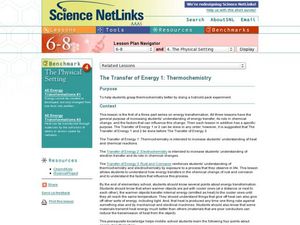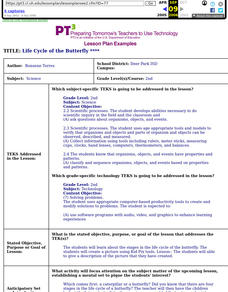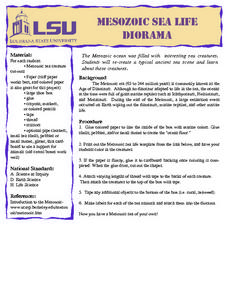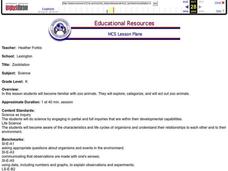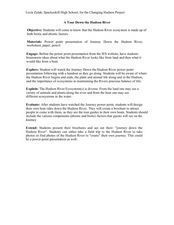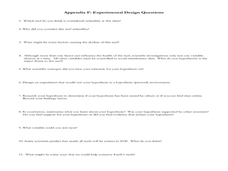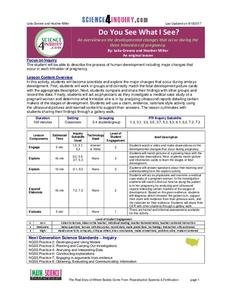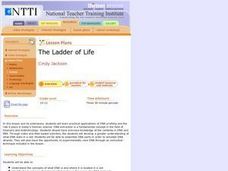Curated OER
The Transfer of Energy 1: Thermochemistry
Budding chemists achieve a basic understanding of the role of heat in chemical reactions. An online worksheet gives learners instructions and questions to answer as they investigate the Chem4Kids website and perform a hands-on lab...
Cornell University
Fibers, Dyes, and the Environment
Nanofibers can be made through electrospinning or force spinning in order to reduce the negative impact on the environment. Pupils study the role of fibers and dye on the environment through a series of five hands-on activities. Then,...
Curated OER
Breathing is Essential to Life
Students explore the job of the lungs. In this Human Body lesson plan, students participate in five activities in order to develop a better understanding of the lungs. Each of the activities relates to how the lungs help us breathe and...
Curated OER
Life Cycle of the Butterfly
Second graders investigate the stages in the life cycle of the butterfly. They create a picture using Kid Pix tools. They give a description of the picture that they have created.
Curated OER
Water: Our Most Important Beverage
Third graders create a KWL chart about water. In this environmental science lesson, 3rd graders demonstrate how much water on Earth is usable. They act out the different stages of the water cycle.
Curated OER
Beach Comber
Students investigate threats to our oceans by investigating items found on a beach. In this environmental safety lesson, students examine several items found on a beach and identify them as natural, harmful, organic or inorganic...
Curated OER
Mesozoic Sea Life Diorama
Students create a diorama depicting Mesozoic sea life. They color a template and add shells and pebbles to the diorama to depict the ocean floor.
Curated OER
Scientific Inquiry
Students investigate the general geology, biology, and chemistry of Seneca Lake. They study how to use scientific instruments on the research vessel. They explain how the data they gather will be used by scientists and develop a hypothesis.
Curated OER
Zoobilation
Youngsters become familiar with zoo animals. They sort them into categories, and choose an animal to act out. Two zoo centers are created in the classroom that have examples of the animals for the pupils to play with. Then, they choose...
Curated OER
Deformed Frogs! - The Parasite Hypothesis
This project provides students the opportunity to investigate parasites as a possible cause of the observed frog deformities. It asks students to view web-based evidence and interpret whether it supports the parasite hypothesis. Students...
University of Georgia
Antacid and Uncle Heartburn
Household materials can be used for more than cleaning! In this collaborative experiment, emerging chemists use products such as vinegar and liquid antacid to explore chemical reactions that commonly occur in the human body.
Curated OER
Effects of Water Pollution on Aquatic Organisms
Students investigate water pollution. They develop an understanding of the behavior of organisms, of the structure and properties of matter, and of natural and human induced hazards by conducting lab tests. They present their data...
Curated OER
Inquiry in Science Using an Animal Behavior Model
Students observe a planaria without a microscope and with a stereoscopic microscope. They draw the planaria and describe its motion and eating habits. Students research planarias various body systems and behavior. They design an...
Smithsonian Institution
Watching Crystals Grow
Amazing science can sometimes happen right before your eyes! The class gets cozy as they watch crystals grow. They use Epsom salts, rocks, and food coloring to create crystals. They'll observe the entire process, documenting every step...
Curated OER
A Tour Down the Hudson River
High schoolers discuss how the Hudson River is an ecosystem made up of both biotic and abiotic factors. They view the PowerPoint the Journal Down the Hudson River. Students become aware of where the Hudson River begins and ends, the...
Curated OER
Marine Biology Lesson on Understanding the Dynamics of the Reef Ecosystem
Students compare data from a healty and unhealthy reef ecosystem. In this marine biology lesson, students identify which sample is stressed. They formulate a hypothesis on why the reef is stressed and support their hypothesis with proven...
Curated OER
SEXUAL LIFE CYCLE DEVELOPMENT USING MONOCYSTIS
Students perform a lab to becoe familar with scientific concepts. The skill of inquiry is essential and this lesson plan furthers its development. The intelligence of kinesthetics is used as learners perform the many aspects of this lab...
Curated OER
Classroom Science Fair Project
Students explore the skills and information needed to complete a science fair project. They follow guidelines to create an document their science fair project.
Science 4 Inquiry
Do You See What I See?
In only nine months, a small group of cells grows into a fully developed baby. Pupils learn about the development of an embryo to a fetus to a baby. They identify each step of weekly development. Young scientists look at ultrasounds to...
US Environmental Protection Agency
Carbon Through the Seasons
Meteorologists view an animated video by the Environmental Protection Agency to learn how the carbon cycle works, and then move into groups to analyze and graph actual data of the atmospheric carbon dioxide concentration from Hawaii's...
Curated OER
Twisted Vision
Students investigate the vision adaptations in marine animals in their environments. In this life science lesson, students use polarized filters and make observations. Students explain how the adaptation of polarized vision is an...
Curated OER
The Science of Ghana
Young scholars explore the climate and food sources of Ghana. In this lesson on climate students view diagrams of global convection and complete a convection experiment.
Curated OER
The Ladder of Life
Students explain the concepts of what DNA is and where it is located in a cell, identify the two types of molecules that make up the rungs of a DNA molecule and identify the two types of Purine and Pyrimidine molecules
Curated OER
Pond Ecology
A lab activity is a great way to incite thoughtful questioning and scientific processes. Pupils will collect organisms with a Petri dish, make observations, sketch the organism, ask questions, then attempt to identify the specimen...
Other popular searches
- Life Science Inquiry Fossils
- Life Science Inquiry Frogs
- Life Science Inquiry Lessons
- Life Science Inquiry Labs
- Life Science Inquiry Mammals
- Life Science Inquiry Chicken
- Inquiry Based Life Science


